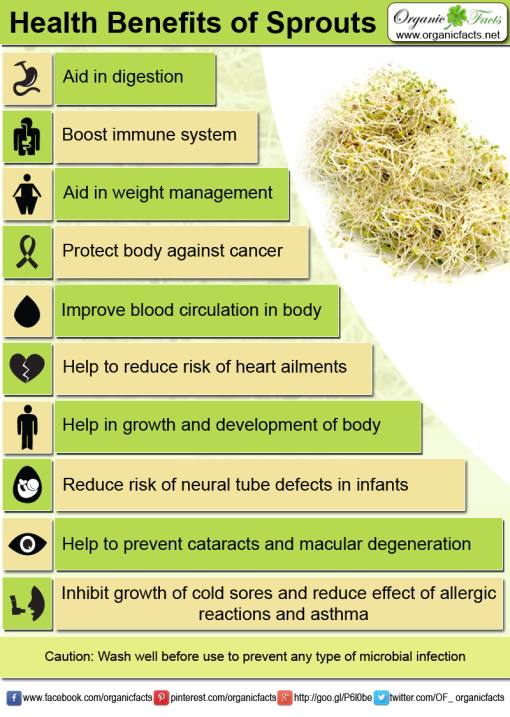Tips for Safe, Healthy Sprouting
Healthy Sprouting Tips
The benefits of sprouting are well-known (see chart down below). They are nutrient-dense foods that are excellent for human health. Now and again, we hear in the news safety concerns about sprouts. Those mostly apply to store-bought sprouts.
We strongly advocate growing our own sprouts. If you adhere to the below guidelines, then you should have a very successful sprouting career.
(Adapted from Cultures for Health & Desert News)
1. Use clean water. Besides the seed, a sprout’s only other ingredient is water. It is therefore imperative that clean, drinking water is used for soaking and rinsing. If unsure, use a filter or bottled water.
2. Clean sprouting process. Wash your hands thoroughly every time you handle the seeds or sprouts.
3. Sprouting vessel. Whether using a jar, sprout tray or hemp bag, sterilize, or at least sanitize, all items that will come into contact with your seeds and sprouts.
4. After soaking your seeds, skim off anything floating on the surface. Research has shown that these “floaters” may be more likely to cause problems.
5. Avoid standing water. Sprouting equipment is designed with airflow in mind, and for good reason. Besides the initial soaking period, it is important to keep sprouts moist, but avoiding standing water in the sprouting container.
6. Rinse frequently. Rinse your seeds/sprouts frequently with clean water. At least twice a day is recommended. (Note: I keep my seeds near the sink and rinse them 3 – 5 times a day, especially during the summer season.)
7. Be careful during warm, humid periods. Both humidity and warmth can breed bacteria, but so long as seeds are rinsed frequently and proper airflow is available, humidity should not be a problem.
7. Completely drain your seeds/sprouts after each rinse. Keeping the seeds/sprouts moist is necessary for germination, but standing water can lead to mold and bacteria.
8. Wait until sprouts are nearly ready for another rinse before putting them into the refrigerator. Likewise, allow airflow to the sprouts during the storage period, to prevent moisture from building up.
9. Dry sprouts with a clean paper towel or use a fine mesh salad spinner to remove all excess water. Store in a clean bag or other sealed container in the refrigerator. (Note: I do not do this but it is not a bad idea. I eat my sprouts quickly and just stick my entire sprouting jar in the fridge, after ensuring there is no standing water.)
10. When serving sprouts, always use a clean utensil. (Note: I have a dedicated tong used only for handling / serving sprouts.)
(Adapted from Cultures for Health & Desert News)

